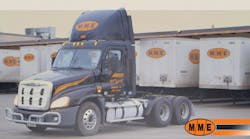The continued pressure to drive down costs in commercial transportation has the industry, from fleet and maintenance managers to OEMs, challenged to look for ways to save. Fuel, representing 30 to 40 percent of a fleet’s operating budget, is a primary target for savings, where even small increases or decreases can impact a bottom line.
Many factors can contribute to better fuel consumption rates. Fleets are paying close attention to load sizes, tire pressure, maintenance practices and driver behavior. While these are all important avenues to consider when developing a fuel economy plan, many fleets are also turning to engine oils to help achieve the cost savings they need.
Lubricants, despite only being approximately 1 percent of total budgets for most fleets, play an important role in engine efficiency and are a cost-effective and immediate way to improve fuel economy on a percent-fuel-reduction-to-capital-investment ratio.
MIDWEST MOTOR EXPRESS
Midwest Motor Express (www.mmeinc.com) of Bismark, N.D., experienced these results first-hand. In the transportation business since 1918, it started out hauling sand, gravel and freight using horses and wagons. Today, with a fleet of more than 350 Freightliners with Detroit Diesel and Mercedes-Benz engines, the company’s top priority is ensuring efficient and reliable results to their customers throughout the upper Midwest and greater Northwest United States.
Frank Dietz, maintenance shop manager for Midwest Motor Express, wanted to extend drain intervals to help reduce costs without sacrificing performance and protection of the fleet. Midwest switched their heavy duty engine oil to Petro-Canada Lubricants’ Duron-E 15W-40, extending drains, lowering maintenance costs and saving more than $83,000 a year.
“The longer oil drain intervals reduce the maintenance costs,” says Dietz. “It’s given us more time to work on other equipment because we’re not spending so much time on preventive maintenance.”
OIL MONITORING
Choosing the right engine oil can help fleets extend drain intervals reliably and effectively, but only in conjunction with proper oil monitoring, says Barnaby Ngai, category portfolio manager, transportation oils, Petro-Canada Lubricants (www.petro-canada.ca). A business of Suncor Energy (www.suncor.com) – a Canadian integrated energy company, Petro-Canada blends and packages more than 350 different lubricants, specialty fluids and greases that are exported to more than 80 countries on six continents.
Regular oil analysis allows maintenance managers to monitor the physical changes occurring in the oil since the last analysis, he notes. For example, it could reveal contaminants or unwanted materials – such as dust, dirt or chemicals, as well as soot clumping and wear particles like metals, and will measure viscosity. This will indicate whether an oil is still suitable for use or an oil change is required.
Fleets also can improve fuel economy by choosing lower viscosity engine oils, adds Ngai. For a fleet making the transition to lower viscosity engine oils, careful consideration is critical in order to realize the benefits from fuel economy improvements, but also to ensure that engines remain protected and uptime is maximized.
REDUCE FUEL CONSUMPTION
Petro-Canada’s Ngai says the trucking industry is looking towards a number of ways to reduce fuel consumption – from vehicle aerodynamics to improved driver behavior, low-friction tires and downspeeding for optimal engine rpm. With proper planning and selection of an oil that does not compromise engine protection for fuel economy, the switch to a high-performing low viscosity heavy duty engine oil can help complete a robust fuel economy program that has the potential to yield excellent results.
Heavy duty engine oil grades such as 10W-30 and 5W-30 have increased in usage, he observes, and this trend is expected to continue as more fleets experience fuel savings with no compromise to engine protection.







